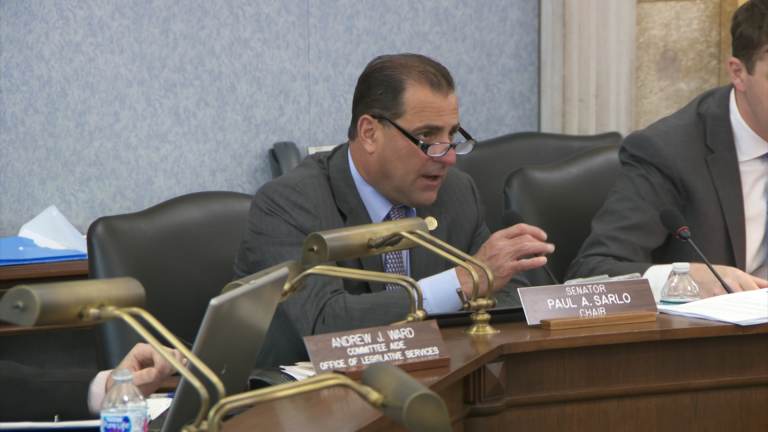N.J. lawmakers advance historic spending increases with $46.4B budget
Legislators, with all seats up for grabs in November, tacked on hundreds of millions of dollars in additional spending to the major budget increase already requested.

Paul Sarlo, chair of the Senate budget committee. (NJ Spotlight)
This story originally appeared on NJ Spotlight.
Final votes on a record $46.4 billion state budget that boosts spending by nearly 15% are expected before the end of the week after lawmakers rushed it and several other key pieces of legislation through budget committees Tuesday.
That action came after legislators, with all seats up for grabs in November, tacked on hundreds of millions of dollars in additional, last-minute spending to the major budget increase that had already been requested by Gov. Phil Murphy several months ago. And the written budget resolutions designed to disclose which individual lawmakers requested spending add-ons have yet to be made public by legislative leaders as the spending bill itself advanced.
Among those last-minute items was new funding for such things as an art museum in Jersey City, property demolition in Camden County and a Little League field in Franklin Township.
Also on the fast track in Trenton are newly released plans to utilize some of the more than $6 billion in federal COVID-19 relief the state received last month, including one program to help people who have fallen behind on their rent and utility bills during the pandemic.
“It’s no different than any other budget,” said Senate Budget and Appropriations Committee Chair Paul Sarlo (D-Bergen) after being pressed to defend the added spending.
“Every budget that I’ve ever been here (for), there’s some budgets that are a little bit more than others, and some budgets, a little bit less,” Sarlo said of the Legislature’s spending additions.
Taken together, the new state budget and the federal aid will set the stage for more than $50 billion in total spending — an enormous sum for a state that often faces budget shortfalls and has routinely left long-term obligations like the public-worker pension system underfunded.
And the final spending total could grow even higher if more than $1 billion earmarked for planned new capital expenditures is eventually spent down during the 2022 fiscal year, which begins on July 1.
Unexpected boost in revenues
Sarlo and other members of the Democratic majority praised the new spending bill as they moved it through budget committees in party-line votes in both the Assembly and Senate late Tuesday afternoon. The final tallies came just moments after 281 pages of bill language were posted on the Legislature’s website at the end of hearings that serve as the public’s only chance to formally weigh in on the annual spending plan.
“I think we’re making some significant strategic investments,” Sarlo said.
During the debate in the lower house’s Budget Committee, Assemblyman John McKeon (D-Essex) noted lawmakers last year feared the pandemic would trigger massive spending cuts.
“I think we should be incredibly excited,” McKeon said. “We thought we were going to be in such a bad situation, we were planning for the worst, and could only dream about the best and that’s what this now represents.”
But Republicans faulted their counterparts, saying that, for all the new spending added by the Democrats, a good share of it went to funding pork instead of tax-relief initiatives.
“Who wants this stuff? And why doesn’t the public know who asked for these bills?” asked Assemblywoman Serena DiMaso (R-Monmouth), referring to the legislative add-ons, which are commonly referred to as “Christmas tree” items in Trenton.
Republicans also raised other transparency concerns Tuesday as several bills came up for votes before they had even been posted online, but ultimately received enough Democratic votes to advance out of committee.
“When did we see the full bill? Only a little while ago,” said Sen. Declan O’Scanlon (R-Monmouth) as one of the measures moved rapidly through the Senate committee.
At times in the Senate Budget and Appropriations Committee, votes were also “recorded” for Democratic lawmakers who were no longer attending the hearing.
Under the current schedule, the spending bill and other legislation related to it will go before both full houses of the Legislature on Thursday. From there, the budget legislation will go to the desk of Murphy, who is expected to sign it unchanged.
$10 billion surplus
A recent windfall of unexpected tax revenue has helped the state amass a budget surplus of more than $10 billion in recent months, but a good portion will be spent down during the 2022 fiscal year under the new spending bill.
In all, the new budget will fund several hundred million dollars in new tax-relief initiatives, including a new rebate program that is being offered to more than 750,000 New Jersey families. Households earning up to $150,000 with at least one dependent child, and single parents with at least one dependent child, will be eligible to receive tax rebates this summer worth up to $500, according to details that have already been made public.
The new budget will also increase the size of Homestead rebates for thousands of senior and disabled, and low- and middle-income, New Jersey homeowners by ending a long-standing practice of using outdated bills to calculate benefits under the program, according to Murphy and the legislative leaders. That practice had eroded the effectiveness of the Homestead program since New Jersey’s average property-tax bills have risen by more than 40% over the past 15 years.
Changes to the Earned Income Tax Credit for low-wage workers and another tax credit offered for child and dependent care are also funded under the new spending bill. It will also increase the exclusion for a state income-tax break for retirement income from $100,000 to $150,000.
Paying down debt
Roughly $2.5 billion is being earmarked for paying down some of the state’s significant bonded indebtedness, and separate legislation will establish a formal “debt defeasance and prevention fund” that will also include $1.2 billion for projects that would otherwise be funded with long-term debt.
That comes after the Murphy administration issued nearly $4 billion in new debt last year with a signoff from lawmakers to help prop up the annual budget. The borrowing was intended to offset significant revenue losses the administration predicted would be triggered by the pandemic that have not materialized. Taxpayers are now stuck funding the interest payments for that debt into the 2030s.
The budget bill calls for leaving roughly $1.3 billion in the state’s “rainy day” fund — a restricted budget reserve that hedges against economic downturns. The fund has long been ignored or only partially replenished by governors and lawmakers, a practice that leaves the state vulnerable whenever revenues slide during a recession.
Another $500 million is being left as an unreserved fund balance, which is another budget reserve, according to the spending bill.
Upping the pension payment
The state’s total annual public-worker pension contribution will increase to nearly $7 billion under the spending bill, up $500 million over what Murphy requested in his original budget plan in February. That would be the state’s first full pension contribution, according to the state’s actuaries, in more than two decades.
Lawmakers said the additional funding for the pension contribution would help the state prepare for an upcoming reduction in the pension funds’ assumed rate of return, which will likely shift more of the long-term funding obligation onto taxpayers.
“I understand there’s another $1.5 billion in spending, but four out of those $10 are going to additional pension funds, which is the best thing we could ever do,” McKeon said.
Colleen O’Dea contributed to this story.
WHYY is your source for fact-based, in-depth journalism and information. As a nonprofit organization, we rely on financial support from readers like you. Please give today.





